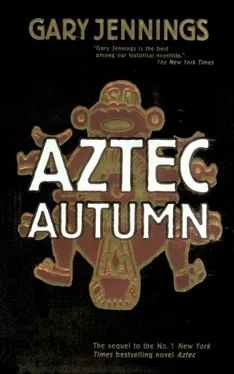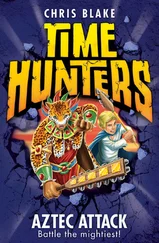Gary Jennings - Aztec Autumn
Здесь есть возможность читать онлайн «Gary Jennings - Aztec Autumn» весь текст электронной книги совершенно бесплатно (целиком полную версию без сокращений). В некоторых случаях можно слушать аудио, скачать через торрент в формате fb2 и присутствует краткое содержание. Жанр: Старинная литература, на английском языке. Описание произведения, (предисловие) а так же отзывы посетителей доступны на портале библиотеки ЛибКат.
- Название:Aztec Autumn
- Автор:
- Жанр:
- Год:неизвестен
- ISBN:нет данных
- Рейтинг книги:4 / 5. Голосов: 1
-
Избранное:Добавить в избранное
- Отзывы:
-
Ваша оценка:
- 80
- 1
- 2
- 3
- 4
- 5
Aztec Autumn: краткое содержание, описание и аннотация
Предлагаем к чтению аннотацию, описание, краткое содержание или предисловие (зависит от того, что написал сам автор книги «Aztec Autumn»). Если вы не нашли необходимую информацию о книге — напишите в комментариях, мы постараемся отыскать её.
Readers familiar with Mexican history will welcome the rich details of this vengeance drama; those new to it will be impressed by Jennings's exhaustive research.
Aztec Autumn — читать онлайн бесплатно полную книгу (весь текст) целиком
Ниже представлен текст книги, разбитый по страницам. Система сохранения места последней прочитанной страницы, позволяет с удобством читать онлайн бесплатно книгу «Aztec Autumn», без необходимости каждый раз заново искать на чём Вы остановились. Поставьте закладку, и сможете в любой момент перейти на страницу, на которой закончили чтение.
Интервал:
Закладка:
"Only command us, Tenamáxtzin."
"It is a weapon that I invented myself, though the Spaniards have something similar, and call it a granada."
I explained how to wrap clay tightly around a packing of pólvora, and insert into it a thin poquíetl for a wick, and bake the thing to hardness in the sun.
"Then, when we go into battle, my lady Butterfly, have each of your women go smoking a poquíetl herself and carrying several of those granadas. Whenever opportunity offers, ignite the wick of a granada and throw it at the enemy or—better yet—inside their houses or guard posts or fortresses. You will see some spectacular damage done."
"It sounds delightful, my lord. We will get to work on them straightaway."
When I had done gnawing on the deer meat, drinking some octli and smoking a poquíetl myself, I called for those two "peculiar" white men to be brought before me.
Well, they turned out to be neither Spanish nor defective, though it took me a confusing while to figure that out. One of the men was considerably older than myself, the other a little younger. Both were as white and hairy as Spaniards, but, like all the other slaves now in our encampment, barefooted and dressed in tatters. They had evidently, somehow, been made aware that I was chief of all the people assembled here, so they approached me respectfully. As Nochéztli had said, they spoke very imperfect Spanish, but we managed mostly to understand each other. However, they sprinkled their converse with words that I can hope only to approximate here, for they did sound like goose talk.
I introduced myself in Spanish simple enough for even a defective to comprehend. "I am called by you Spanish folk Juan Británico. What are you—?"
But the older one interrupted, "John British?!" and both of them stared at me, wide-eyed, then quacked excitedly at one another. I could catch only repetitions of that word British.
"Please," I said, "speak Spanish, if you can."
So they did, mostly, from then on. But in my recounting of that conversation, I am making them sound much more fluent than they were, and also I am doing my best to pronounce the frequent goose words.
"Your pardon, John British," said the elder of the two. "I was saying to Miles here that, by the blood, we are finally having a run of—a run of what we call luck—a run of buena suerte. You must be a castaway, same as us. But Miles said, and so do I—begod, Cap'n, you do not appear to be British."
"Whatever that is, I am not," I said. "I am Aztécatl—you would say indio—and my name is properly Téotl-Tenamáxtli." Both men looked at me with faces as blank as only white faces can be. "None but the Spanish call me by the Christian name of Juan Británico."
Some more honking and hissing went on between them, the word Christian occurring several times. The elder turned again to me.
"At least you are a Christian indio, then, Cap'n. But would you be one of these damned crossback Papists? Or would you be good Bishop's-Book Church of England?"
"I am not any kind of Christian!" I snapped. "And I am asking the questions here. Who are you?"
He told me, and it was my turn to look blank. The names could as well have been Yaki as goose. They certainly were not Spanish.
"Here," he said. "I can write." He looked about for a sharp stone, while saying, "I am a ship's sea-artist, I am. What the Spaniards call a navegador. Miles is only fo'c'sle, and ignorant." With the stone, he scratched in the earth at my feet, which is why I can accurately render the names here, JOB HORTOP—"That is me"—and MILES PHILIPS—"That is him."
He had mentioned ships and sea, so I asked, "Are you in the sea service of King Carlos?"
"King Carlos?!" they bellowed together, and the younger one added indignantly, "We serves good King Henry of England, bless his brass ballocks. And that, God damn it, is why we are here where we are at!"
"Pardon him, John British," said the elder. "Common seamen got no manners."
"I have heard of England," I said, remembering what Padre Vasco had once told me. "Are you perhaps acquainted with Don Tomás Moro?" Blank looks again. "Or his book about Utopia?"
The sea-artist sighed and said, "Your pardon again, Cap'n. I can read and write, some. But I never read no books."
I sighed, too, and said, "Please just tell me how you come to be here."
"Aye aye, sir. What happened, see, we shipped on a Hawkins merchantman out of Bristol, sailing under Genoese patent to take a cargo of ebony—you know what I mean—the middle passage from Guinea to Hispaniola. Well, we got as far as Tortoise Island. A storm wrecked us on them reefs, and me and Miles was the only ones of the white crew that washed ashore alive, along with numerous of the ebony. The damned piratical Jack Napeses there took us slaves, same as they did the blacks. We been passed from hand to hand ever since—Hispaniola, Cuba—wound up picking oakum in a Vera Cruz dockyard. When a bunch of the blackamoor slaves busted loose, we come with them. No place to aim for, but the blacks got word that some rebels was mustering in these mountains. So here we are, Cap'n. Rebels against them firking Spanish we be, by damn, if you will have us. And happy we will be, me and Miles, to kill every whoreson Jack Napes you can point us at. Just give us a cutlass apiece."
Not much of that made any sense to me, except the last part, at which I said:
"If you mean you wish to fight beside us, very well, you will be given weapons. Now, since I am the only person in this army who can—even toilsomely—understand and be understood by you..."
"Your pardon again, John British. A good many of them slaves yonder—blacks and indios and mongrels too—speaks the Spanish better than we does. One little half-breed wench, she can even read and write it."
"Thank you for telling me. That one may be useful when I want to send some Spanish city a declaration of siege, or dictate terms of its surrender. Meanwhile, I being the only commander in this army who can speak to you, I suggest that, when we go into battle, you both stay close to me. Also, since your names come hard to my tongue—and in battle I may have to speak them with urgency—I shall call you Uno and Dos."
"We been called worse names," said Dos. "And please, sir, can we call you Cap'n John? Make us feel at home, like."
XXVIII
The man Coronado... passed me... six days ago..." the runner gasped, as he sank wearily to his knees and elbows on the ground before me, his body heaving for breath and streaming with sweat.
"Then why," I demanded angrily, "has it taken you so long to report here?"
"You wanted... a count... my lord," he panted. "Four days counting... two days running..."
"By Huitztli," I murmured, now sympathetically, and I patted the man's wet, trembling shoulder. "Rest, man, before you speak more. Nochéztli, send for water and some kind of food for this warrior. He has been hard at his duty for six days and nights."
The man drank gratefully but, being an experienced swift-runner, drank only sparingly at first, then tore voraciously at the stringy deer meat. As soon as he could speak coherently and uninterrupted by gasps, he said:
"First came the man Coronado and beside him a man in priest-black garb, both mounted on fine white horses. Behind them came many mounted soldiers, four by four where the path was wide enough, more often two by two, because Coronado chose a trail not much traveled, hence not much cleared. Every horseman, except that one in black, wore the metal helmet and full metal and leather armor, every man carrying a thunder-stick and steel sword. Every mounted man led behind him one or two more horses besides. Then there came more soldiers, similarly armored, but these on foot, carrying thunder-sticks and long, wide-bladed spears. Here, my lord—the count of all those soldiers."
Читать дальшеИнтервал:
Закладка:
Похожие книги на «Aztec Autumn»
Представляем Вашему вниманию похожие книги на «Aztec Autumn» списком для выбора. Мы отобрали схожую по названию и смыслу литературу в надежде предоставить читателям больше вариантов отыскать новые, интересные, ещё непрочитанные произведения.
Обсуждение, отзывы о книге «Aztec Autumn» и просто собственные мнения читателей. Оставьте ваши комментарии, напишите, что Вы думаете о произведении, его смысле или главных героях. Укажите что конкретно понравилось, а что нет, и почему Вы так считаете.











